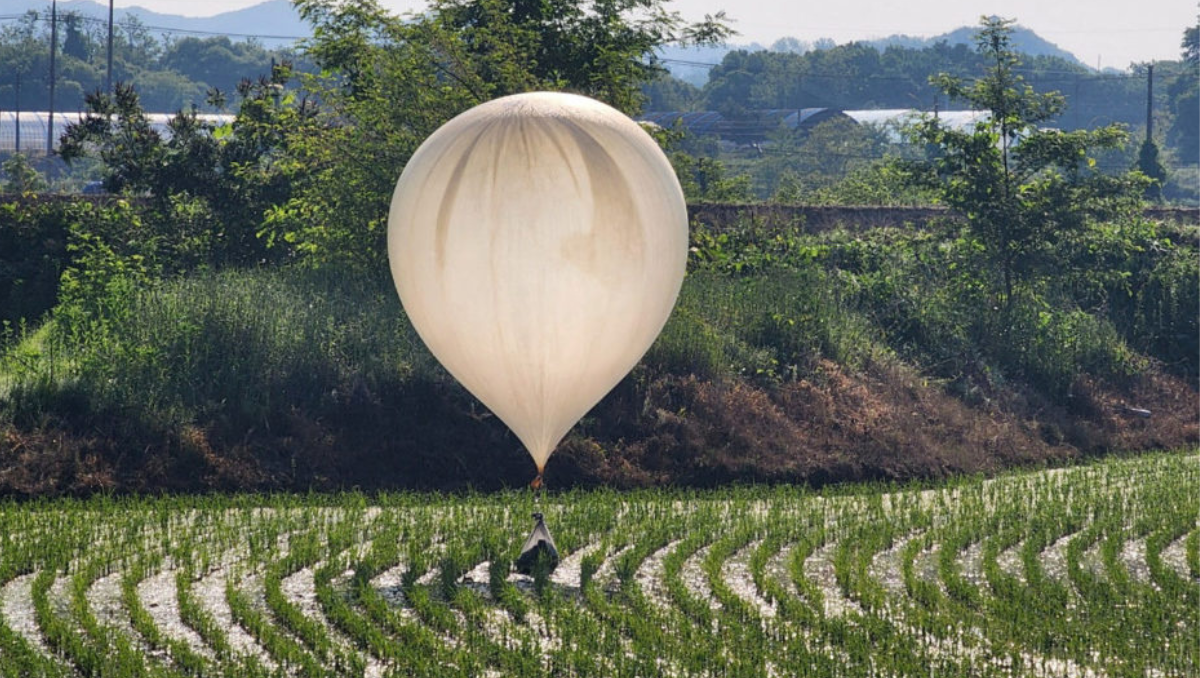North Korea has announced that it will no longer be breaching the border into South Korea with garbage-filled balloons, citing its campaign as a successful response against propaganda provided by activists in the neighbouring country who are against the regime. South Korea’s military stated on Sunday that it has observed numerous balloons carrying trash bags across the border including fragments of cardboard and plastic and cigarette butts. The military in Seoul also promised to strike if the provocations continued.
North Korea’s Response
According to a statement made public by state media KCNA on Sunday, North Korea’s vice-defense minister Kim Kang Il announced that the nation will “temporarily halt dropping trash over the border” after asserting that it had transferred a total of 15 tonnes of waste to its neighbour. He claimed that South Korea has sufficient experience with how unpleasant and difficult it is to collect rubbish, having dispatched 15 tonnes of waste using 3,500 balloons.
According to Kim, the balloons were “strictly a responsive act” to South Korea’s long-standing pattern of sending balloons bearing leaflets critical of North Korea in the opposite direction.
An official from South Korea stated that if North Korea continues to launch garbage balloons this weekend, the country would take “unendurable measures” against them, which would be “specified in the coming days”. The presidential office official went on to say that the government “will not rule out the issue of restarting [playing] loudspeakers,” which were switched off after a military accord was made in 2018 and were used to blast propaganda over the demilitarised zone.
In contrast to a few days prior, when used toilet paper was discovered in a few of the 150 balloons that crossed the border, the Joint Chiefs of Staff of South Korea reported that “no substances harmful to safety” were found among the hundreds more balloons that arrived in the country on Saturday night. To securely remove the balloons and the debris, South Korea said that the military is collaborating with the police, the local government, the safety ministry, and the United Nations Command. The provinces of Gyeonggi and Chungcheong as well as the nation’s capital, Seoul, were where the balloons were discovered.
History
Even though the Korean War (1950–1953) concluded with an armistice rather than a peace treaty, the democratic South and the communist North are still officially at war. Seoul, a powerful ally of the United States, conducts frequent military exercises with the US, while Pyongyang is working on nuclear and missile technologies that Seoul and Washington claim violate UN resolutions.
North Korean defectors and activists in South Korea, who frequently transport inflatables holding anti-Pyongyang writings, medicine, food, money, and USB sticks filled with K-pop music videos and dramas across the border, have claimed that North Korea launched the balloon campaign in retaliation.
The balloon rivalry
North and South Korea engaged in psychological warfare during the Cold War. They attempted to sway each other’s citizens by using propaganda-filled shortwave radio broadcasts. Propaganda music was played over the loudspeakers, day and night, to opposing soldiers. Additionally, the two Koreas entered each other’s airspace with balloons carrying flyers. Across the Korean Peninsula, there were millions of these polarising pamphlets stigmatising the government of the opposite side. Both Koreas forbade their citizens from reading or retaining them.
It was evident by the 1990s that the North’s propaganda was becoming less effective as the South’s economy grew. While the North experienced ongoing food shortages and used a complete information blackout and personality cult to maintain control over its citizens, the South had developed into a thriving democracy and a major player in international trade.
Following the first inter-Korean summit conference in 2000, the leaders of the two Koreas decided to stop government-sponsored attempts to sway each other’s citizens. However, the information war was continued by North Korean defectors in the South. They sent flyers calling Mr. Kim a “pig,” transistor radios, household medicine, balloons filled with mini-Bibles, and computer USB drives filled with K-pop drama and music. They were seen by Pyongyang as nothing more than political “filth,” and officials in North Korea vowed to respond accordingly.
Later, the Seoul government passed a rule forbidding the distribution of pamphlets to the North, claiming that doing so would only agitate Pyongyang. However, the court declared the prohibition illegal a few years later, in 2023, and the activists started flying balloons again last month.
